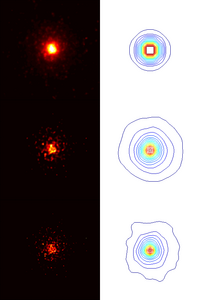
Photo from wikipedia
This article addresses the problem of the Non Unitary Joint Block Diagonalization ($$\mathsf {NU-JBD}$$NU-JBD) of a given set of complex matrices for the blind separation of convolutive mixtures of sources.… Click to show full abstract
This article addresses the problem of the Non Unitary Joint Block Diagonalization ($$\mathsf {NU-JBD}$$NU-JBD) of a given set of complex matrices for the blind separation of convolutive mixtures of sources. We propose new different iterative optimization schemes based on Conjugate Gradient, Preconditioned Conjugate Gradient, Levenberg–Marquardt and Quasi-Newton methods. We perform also a study to determine which of these algorithms offer the best compromise between efficiency and convergence speed in the studied context. To be able to derive all these algorithms, a preconditioner has to be computed which requires either the calculation of the complex Hessian matrices or the use of an approximation to these Hessian matrices. Furthermore, the optimal stepsize is also computed algebraically to speed up the convergence of these algorithms. Computer simulations are provided in order to illustrate the behavior of the different algorithms in various contexts: when exactly block-diagonal matrices are considered but also when these matrices are progressively perturbed by an additive Gaussian noise. Finally, it is shown that these algorithms enable solving the blind separation of the convolutive mixtures of sources problem.
Journal Title: Multidimensional Systems and Signal Processing
Year Published: 2018
Link to full text (if available)
Share on Social Media: Sign Up to like & get
recommendations!